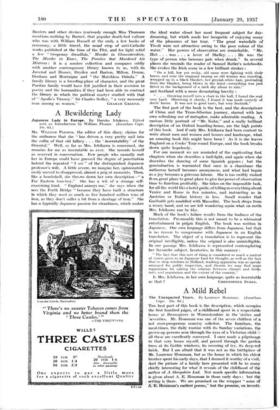A Bewildering Lady
Japanese Lady in Europe. By Haruki) Ichikawa. Edited with an Introduction by William Plomer. (Jonathan Cape. 10s. 6d.) MR. WILLIAM PLOMER, the editor of this diary, claims for the authoress that she " has driven a very pretty nail into the coffin of that old fallacy . . . the ' inscrutability ' of the Oriental." Well, so far as Mrs. Ichikawa is concerned, she remains for me as inscrutable as ever. She records herself as reserved in conversation. Few people who casually met her in Europe could have guessed the degree of penetratiOn behind the repeated " I see " of the distinguished Japanese professor's wife. A little severe, we imagine her, opinionated, easily moved to disapproval, almost a prig at moments. Then, like a bombshell, she throws down her own description—" a Far Eastern tom-boy." She has a wit of a • strange self- examining kind. " England annoys me," she says when she Sees the Forth Bridge " because they have built a structure in which they used as much as five hundred million tons df iron, as they don't suffer a bit from a shortage of iron." She has a typically Japanese passion for cleanliness, which makes
the ideal water closet her most frequent subject for day- dreaming, but which made her incapable of enjoying many of the pleasures of her tour. " The great waterfalls of Tivoli were not attractive owing to the poor colour of the
water." Her powers of observation- are remarkable. " Mr.
Hsii . . . was . . . a lover of Shelley. . . . He was the type of person who becomes pale when drunk." In several places she reminds the reader of Samuel Butler's notebooks.
She evokes the Irish scene in a few brilliant strokes :
" On a hill, low yet rocky, old rams were fighting with their horns, and near the stagnant swamp an old woman was standink, wrapped up in a black blanket, her greyish-white hair, protruding from the blanket, being blown in the wind—everything was just fitted to the background of a dark sky about to rain.
and Scotland with a more devastating brevity :
" . . . throwing-myself into a chair in the hall, I found the seat very hard. Observing. it closely, I _found it was made entirely of deers' horns. It was not in good taste, but very Scottish."
The first part of the book is the best, and the descriptions of China and the Trans-Siberian journey, starred with her own refreshing use of metaphor, make admirable reading. A curious little portrait of "Mr. Kahn," and a really brilliant
description of an. Oxford boarding-house, are the high points of this book. And if only Mrs. Ichikawa had been content to write about men and women and houses and landscape, what an amazing book this might have been As it is she leaves England on a Cooks' Tour round Europe, and the book breaks down quite hopelessly.
For one moment we are reminded of the captivating first chapters when she describes a bull-fight, and again when she describes the dancing of some Spanish gypsies ; but the generalisation is warranted that once in a charabanc the authoress herself becomes anonymous, and what had begun as a joy becomes a grievous labour. She is too swiftly rushed front great place to great place to give her power of observation time to function profitably. She takes on the impossible task, for all the world like a hotel guide, of telling us everything about Venice and Rome in five minutes, and instructing us in Austrian or Italian history , in less. Small wonder that Garibaldi gets muddled with Mussolini. The book drops from a weary hand, and we are left wondering again what on earth Mrs. Ichikawa can be like.
Much of the book's failure results from the badness of the translation. Presumably this is not meant to be a whimsical entertainment in pidgin English. The book was written in Japanese. Our own language differs from Japanese, but that is no reason to compromise with Japanese in an EngliSh translation. The object of a translation is to represent the original intelligibly, unless the original is also unintelligible. In one passage Mrs. Ichikawa is represented contemplating her favourite subject, lavatories, in this manner :
" The fact that this sort of thing is considered so much a matter of course gives to us Japanese food for thought, as well as the fact that in shop windows in Holland, washing apparatus was so openly arranged for public inspection, and therein tee may find scene suggestions for solving the relation between climate and birth- rate, and population and the extent of the country."
Is Mrs. Ichikawa, in her own language, quite as inscrutable






















































 Previous page
Previous page